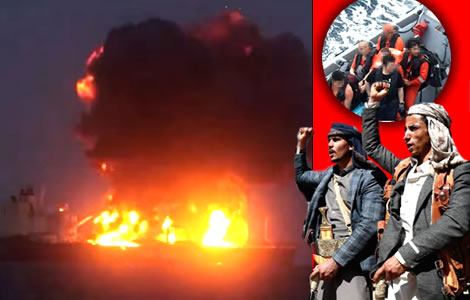Red Sea terror as Houthi militants capture and set fire to a Greek oil tanker carrying 150,000 tons of crude oil, raising fears of a widening war and environmental disaster. The attack marks the latest escalation in Middle Eastern hostilities.
The escalation of hostilities in the Middle East continues. The latest concern is the capture of a Greek oil tanker in the Red Sea. The vessel, carrying 150,000 tons of crude oil, was captured by Houthi forces on Wednesday. In the last 24 hours, the Yemen-based forces have released video clips showing an explosion on the tanker and a massive fireball.

In a chilling display of violent destruction, Yemen’s Houthi militants have struck again, this time targeting a Greek oil tanker in the Red Sea. The attack, which saw the ship engulfed in flames, has raised alarm over the potential environmental disaster that could follow.
A Dramatic Assault at Sea
The tanker, identified as the Sounion, was carrying a staggering 150,000 metric tons of crude oil when it was hit. Video footage released by the Houthi militants shows the vessel erupting into massive flames as explosions rip through its deck.
The militants, visible in the distance on small boats, can be heard chanting their notorious slogan: “God is the greatest; death to America; death to Israel; curse the Jews; victory to Islam.”
Initial analysis of the footage by Reuters suggests that the explosions were caused by planted explosives rather than a missile or drone strike, indicating a calculated and deliberate attack.
This theory is supported by the fact that three simultaneous blasts were detected on the ship’s deck, further pointing to sabotage.
A High-Stakes Rescue Operation
The attack unfolded on Wednesday when the Sounion was halted in the Red Sea shipping channel, 77 nautical miles west of the Yemeni port of Hudaydah. The UK Maritime Trade Operations (UKMTO) reported that more than a dozen militants on two small boats approached the tanker and opened fire, forcing it to stop.
In response, the European Union’s Red Sea naval mission swiftly launched a rescue operation. On Thursday, a French destroyer was deployed to evacuate the ship’s crew, which consisted of 23 Filipinos and two Russians. The crew was safely transported to the nearby port of Djibouti, averting a potential loss of life in what could have been a far deadlier situation.
An Environmental Time Bomb
While the crew is safe, the Sounion itself remained adrift in the Red Sea, without engine power and laden with crude oil. The ship was en route from Iraq to a port near Athens when the attack occurred, and its current state poses significant risks to both navigation and the environment.
The EU’s Red Sea naval mission Aspides has sounded the alarm. Presently, it is warning that the disabled tanker is now “a navigational and environmental hazard.” The Djibouti Ports & Free Zones Authority echoed these concerns. It insists that a potential oil spill could have “disastrous consequences for the region’s marine environment.”
The Red Sea is a crucial global shipping route. Significantly, any disruption, particularly one involving an oil spill, could have far-reaching effects. Environmentalists fear the oil will leak into the sea. Certainly, it could devastate the marine ecosystem, impacting both local fisheries and international trade routes.
Escalating Hostilities
This attack is part of a broader campaign by Yemen’s Houthi movement. At the same time, it has increasingly targeted commercial shipping in the Red Sea and Gulf of Aden. Since November, the group has launched more than 80 attacks on vessels in the region. The campaign they claim is in solidarity with Palestinians amid the ongoing war in Gaza.
Srettha and top officials become more critical of Israel as Hamas uses Thai hostages as leverage in War
The Houthis, who are backed by Iran, have used these attacks to assert their presence on the global stage. In short, their goal is to create chaos in one of the world’s most vital maritime corridors. Their actions have drawn international condemnation. Many nations have expressed concern over the escalating threat to global trade and regional stability.
A Call for International Response
The attack on the Sounion has intensified calls for a coordinated international response to the Houthi threat. The European Union and other global powers have condemned the attack. They are calling for increased security measures in the Red Sea.
However, the situation remains volatile. There are fears that the Houthis will continue their campaign of terror in the region. As tensions escalate, the potential for further attacks on commercial shipping remains elevated. Undoubtedly, it is raising the stakes for both regional and international actors, particularly the United States.
Join the Thai News forum, follow Thai Examiner on Facebook here
Receive all our stories as they come out on Telegram here
Follow Thai Examiner here
Further reading:
Thai hostages held by Hamas used to leverage influence over Israel as it prepares to invade Gaza
Israel to pay ฿35k per month to wives of Thai workers killed in Hamas raid and child support
Rogue Israeli tourist is taken into custody by Immigration Bureau police prior to deportation
On the run Israeli tourist tracked down to Ko Samui, surrenders to authorities, taken to hospital
Thailand votes on the right side of history in UN deploring Russian military action in Ukraine


















